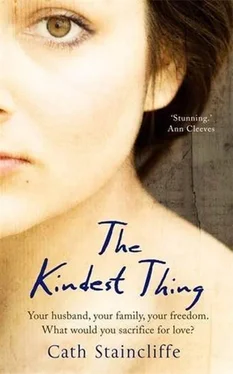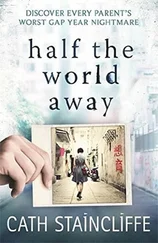Being a prisoner, I enter the court up steps that lead from the cells beneath. When I hear the clatter of our shoes on the marble, my thoughts seem to fly apart in fragments, like spilled beads rolling into the shadows, under furniture, out of sight. I cannot remember what the solicitor said. There’s an urge to run, to flee or buckle.
The room bristles with attention as I appear. Afraid, I do not dare look round yet. I need to place my feet one in front of the other and turn so as to reach the dock. The usher nods that I may sit and I do, letting my gaze fall on the warm, worn wood of the ledges around me. My cheeks are aflame and my pulse thrums heavy in my neck. There are whispers and muttered conversations and the rustle of papers – all the lawyers have great big folders. They march around with them, in one arm, all importance. Well, it is important, the reports and records and documents that speak to liberty or incarceration.
Little by little, I raise my eyes, glancing to my left, across the people seated in the main well of the court. My barrister, Mr Latimer, the one in charge of my defence, is a bullish man with an unfortunately appointed nose and beefy skin. He stammers but he has a technique for overcoming that in public, a sing-song delivery that reminds me a little of the comedian Kenneth Williams stretching out his time on the radio quiz Just A Minute , though Kenneth was way more camp. Beside Mr Latimer is his junior. And beside them my messy solicitor, Ms Gleason, takes her seat. She’s the one who’s held my hand for all these months. Today the hair has been pulled back in a barrette. She smiles across and nods. She is watching me and the others are talking shop.
Beyond them is the prosecution table. I have already been told about their team but the names escape me now. The main prosecutor is a woman and she has a male aide.
My heart squeezes as my eyes light on Adam in the public gallery. My boy. I am so glad he has come. That seems bizarre. What mother wants her child to see her tried for murder? Next to him, Jane. Jane and I are the same height but she’s a bigger build. More padding, she says. She’s on a diet every few months and shifts a few pounds. Then it creeps back on. She can’t stop smoking either. She’s done the lot, everything from patches to acupuncture.
I try to smile but my lips jerk about in some ghastly jig. Adam bows his head suddenly, close to tears, I think. Jane gives a wry smile. She has always been there for me. Have I been as good a friend? Jane is giddy, gregarious. She’s never really left the hubbub of her childhood, competing with her three brothers for a spot in the limelight. The phrase ‘good for a laugh’ comes to mind. Not that she is frivolous or shallow, more that she has a ripe sense of humour. She sees the funny side and points it out. People mistake her comic vision for happiness but Jane has had a hard time of it. Since Mack left her she’s never found the right man. And she’s very lonely. She’s a manager in the NHS, her working life a mire of reports and strategies, evaluation and targets. She and Neil had plenty to moan about together, swapping anecdotes of bureaucratic lunacy and governmental folly.
Sophie isn’t there, or Veronica or Michael. There are other faces – I’m startled to see two of Neil’s colleagues, and people I don’t recognize. The gallery is full. I’m quite a draw. Who are all these strangers? What brings them here?
The team have dressed me in mumsy clothes, Marks & Sparks, a plain light blue blouse, navy skirt, opaque tan tights. The skirt rustles against the tights when I walk. I hate these clothes. I’m a fraud. I’ve never worn things like this in my life. School uniform came closest. But I will do whatever they tell me now. At their mercy. They even brought earrings, small gold studs. My fingers seek out my wedding ring. I twist the familiar smooth metal.
We bought our rings from Lewis’s. It’s hard to remember now why we got married. It certainly wasn’t part of some shared dream of white silk dresses and pageboys and speeches. And we didn’t do it to stock up on toasters and tableware, either. I did wear silk – and taffeta – a gorgeous cherry red cocktail dress that I found in a dress agency in Stockport. Neil wore a black suit and shirt and a bolo string tie. He still had his hair long and looked like an extra, a pioneer in some Wild West movie. We got hitched at the register office and only told our families afterwards. They were hugely disappointed. My mother gave a little ‘Oh!’ of regret on the phone, as though I’d punched her in the stomach, which perhaps I had. And Veronica was furious: the register office ceremony wasn’t a union in the eyes of God. But I was a non-believer, with no intention of converting, and Neil had been lapsed for years. Neil told me they tried to keep it all secret from their Catholic friends.
I’d had boyfriends before Neil, I’d even had some after, but sooner or later they had irritated me. The reasons varied, the timescale too, but eventually their childishness, the way they held my hand or their taste in music, the smell of their skin or the pattern of their conversation would pall and then rankle – like grit in my shoe, producing a blister, not a pearl. Soon everything about them would be wrong and I’d be planning my farewell speech.
‘You want perfection,’ Jane had said, when I was dumping my first boyfriend at uni. ‘It’s impossible. Give him a bit longer.’ She finished rolling a joint, lit it and sucked hard.
‘No, I feel trapped. When I think of carrying on I feel panicky.’
She’d shaken her head. ‘He’s so sweet.’
‘It’s not enough. I know he’s sweet and pretty good-looking, and he’s not dumb but… I can’t change how I feel. I can’t unthink what I’ve been thinking about him.’
‘Unthink?’
I held out my hand for the joint, the first two fingers splayed. ‘Exactly, not possible.’
So when I asked Jane to be a marriage witness for Neil and me, she reminded me of how picky I was. ‘What if you go off him?’
‘We’ve lasted six years.’ I laughed. ‘It’s him going off me I’m worried about.’
‘You love him more than he loves you.’
‘Do I?’
Had that been true? Back then or as time went by? Had the power in the relationship shifted? I wasn’t sure. Rather, I thought, the intensity of feeling we had, the desire for love and the need for independence, ebbed and flowed between us like a subtle tide.
Jane was one of our witnesses and Tony Boyd, Neil’s old school friend, the other. Tony was a lovely man who could consume more illegal drugs then anyone I’ve ever met and still acquit himself decently. He’d got hold of cocaine for our wedding party. It was pretty rare then and more expensive too.
We’d all booked into a hotel in the Derbyshire peaks, and once we’d checked in we took a picnic out into one of the deep valleys, still in our finery. The four of us got stoned and went paddling, drank champagne and rolled about in hysterics. We’ve a handful of photos left from the day – I had my camera with me – but there’s only one with all of us in. We roped in a passing hiker who did the honours. I look so young; we all do. The dress, its strappy top and flared skirt, glows against the green of the grass, the colours acidic.
When friends heard we were married, some were quite shocked. They’d assumed we had rejected the institution, that we’d live together in defiance of hidebound rituals. If Neil hadn’t proposed perhaps we would have. But I liked my new status. I think I needed the conspicuous commitment, though I kept my own name. And bank account.
Jane once asked me whether I thought Adam’s troubles might have been made worse because we’d taken a relaxed approach to drugs, never hiding our own history of experimentation. I gave her question some thought. Had he needed limits that we’d failed to provide? Had he needed different boundaries? But in the end I couldn’t see it. If we’d hidden our views and adopted a rigid just-say-no stance, his dabbling would have been even more covert and we’d only have learned later how the drugs were affecting his mental health.
Читать дальше












